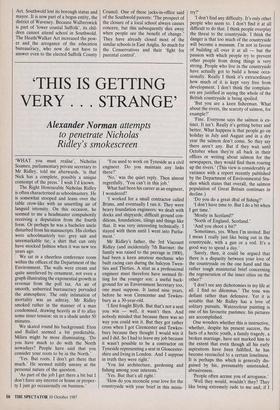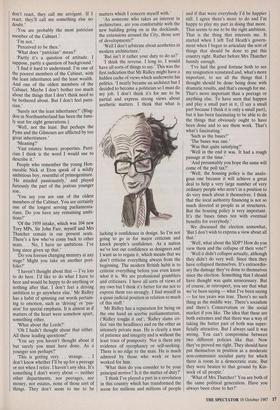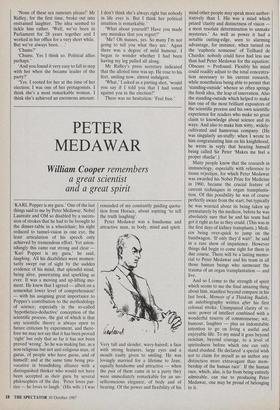'THIS IS GETTING VERY. . . STRANGE'
Alexander Norman attempts to penetrate Nicholas Ridley 's smokescreen 'WHAT you must realise', Nicholas Soames, parliamentary private secretary to Mr Ridley, told me afterwards, 'is that Nick has a complete, possibly a unique contempt of the press.' I wish I'd known.
The Right Honourable Nicholas Ridley is often characterised as schoolmastery. He is somewhat stooped and leans over the table crow-like with an unsettling air of languid intensity. On this occasion, he seemed to me a headmaster compulsorily receiving a deputation from the fourth form. Or perhaps he was a bachelor uncle disturbed from his manuscripts. His clothes were schoolmasterly too: grey suit and unremarkable tie; a shirt that can only have mocked fashion when it was new ten years ago.
We sat in a cheerless conference room within the offices of the Department of the Environment. The walls were cream and quite unrelieved by ornament, not even a graph illustrating the exponential growth in revenue from the poll tax. An air of smooth, unhurried bureaucracy pervaded the atmosphere. The only intimation of mortality was an ashtray. Mr Ridley smoked rather in the manner of a man condemned, drawing heavily as if to allay some inner tension: six in a shade under 50 minutes.
We skated round his background: Eton and Balliol seemed a bit predictable. Milieu might be more illuminating. 'Do you have much to do with the North nowadays? People have said that you consider your roots to be in the North.'
'Yes. But roots. I don't get there that much.' He seemed mildly uneasy at the personal nature of the question.
'As part of the job I get there a bit but I don't have any interest or house or proper- ty I just go occasionally on business.' 'You used to work on Tyneside as a civil engineer. Do you maintain any links there?'
'No,' was the quiet reply. Then almost regretfully, 'You can't in this job.'
What had been his career as an engineer, I wondered?
'I worked for a small contractor called Brims, and eventually I ran it. They were heavy foundation engineers: we dealt with docks and shipyards; difficult ground con- ditions, foundations, tilings and things like that. It was very interesting technically. I stayed with them until I went into Parlia- ment.'
Mr Ridley's father, the 3rd Viscount Ridley (and incidentally 7th Baronet: the family was raised to the peerage in 1900), had been a keen amateur mechanic who built racing cars during the halcyon Twen- ties and Thirties. A stint as a professional engineer must therefore have seemed fit- ting for the younger son: a useful back- ground for an Environment Secretary too, one must suppose. It lasted nine years, before he won Cirencester and Tewkes- bury as a 30-year-old.
'I first fought Blyth. But that's not a seat you win — well, it wasn't then. And nobody minded that because there was no way you could win it. But they got rather cross when I got Cirencester and Tewkes- bury because they thought I would win it and I did. So I had to leave my job because it wasn't possible to be a contractor on Tyneside representing a seat in Gloucester- shire and living in London. And I suppose in truth they were right.'
'You list architecture, gardening and fishing among your interests.'
'Yes. But that's all right.'
'How do you reconcile your love for the countryside with your brief in this minis- try?'
'I don't find any difficulty. It's only other people who seem to. I don't find it at all difficult to do that. I think people overplay the threat to the countryside. I think the danger is that too much of the countryside will become a museum. I'm not in favour of building all over it at all — but the passion with which people try to prevent other people from doing things is very strong. People who live in the countryside have actually got to build a house occa- sionally. Really I think it's extraordinary how much of it is kept very free from development. I don't think the complain- ers are justified in saying the whole of the British countryside is being spoiled.
'But you are a keen fisherman. What about the rivers, the scarcity of salmon, for example?'
'Fine. Everyone says the salmon is ex- tinct. It isn't. Really it's getting better and better. What happens is that people go on holiday in July and August and in a dry year the salmon don't come. So they say there aren't any. But if they wait until October when they're all back in their offices or writing about salmon for the newspapers, they would find them roaring up the rivers.' (This view is considerably at variance with a report recently published by the Department of Environmental Stu- dies which states that overall, the salmon population of Great Britain continues in decline.) 'Do you do a great deal of fishing?'
'I don't have time to. But I do a bit when I get time.'
'Mostly in Scotland?'
'North of England, Scotland.'
'And you shoot a bit?'
'Sometimes, yes. When I'm invited. But I mean I really just like being out in the countryside, with a gun or a rod. It's a good way to spend a day.'
'Surely, then, it could be argued that there is a disparity between your love of the countryside on the one hand and this rather tough ministerial brief concerning the regeneration of the inner cities on the other?'
'I don't see any dichotomies in my life at all. I find no dilemmas.' The tone was defiant rather than defensive. Yet it is notable that Mr Ridley has a love of solitary pursuits. Watercolour painting is one of his favourite pastimes: his pictures are accomplished.
One wonders whether this is instructive, whether, despite his present success, the facts of a hectic youth, a family tragedy, a broken marriage, have not marked him to the extent that even though all his early aspirations have been fulfilled, he has become reconciled to a certain loneliness. It is perhaps this which is generally dis- guised by his, presumably unintended, abrasiveness.
'People often accuse you of arrogance.' 'Well they would, wouldn't they? They like being extremely rude to me and, if I don't react, they call me arrOgant. If I react, they'll call me something else no doubt.'
You are probably the most patrician member of the Cabinet.'.
'I'm not.'
'Perceived to be then.'
'What does "patrician" mean?'
'Partly it's a question of attitude, I suppose, partly a question of background.'
'I find it hard to understand. I'm one of the poorest members of the Cabinet, with the least inheritance and the least wealth. And one of the oldest members of the Cabinet. Maybe I don't bother too much about the things that I don't think need to be bothered about. But I don't feel patri- cian.'
'Surely not the least inheritance?' (Blag- don in Northumberland has been the fami- ly seat for eight generations.) 'Well, not the least. But perhaps the Pyms and the Gilmours are afflicted by too great inheritances.'
'Meaning?'
'Vast estates: houses: properties. Patri- cian I think is the word I would use to describe it.'
People who remember the young Hon- ourable Nick at Eton speak of a wildly ambitious boy, resentful of primogeniture. 'He minded passionately,' and played furiously the part of the jealous younger son.
'You say you are one of the oldest members of the Cabinet. You are certainly one of the longest serving parliamenta- rians. Do you have any remaining ambi- tions?'
'Of the 1959 intake, which was 104 new Tory MPs, Sir John Farr, myself and Mrs Thatcher remain in our present seats. There's a few who've come back to other seats. . . No, I have no ambitions. I've long since given up that.'
`Do you foresee changing ministry at any stage? Might you take on another port- folio?'
'I haven't thought about that — I've lots to do here. I'd like to do what I have to here and would be happy to do anything or nothing after that. I don't feel a driving ambition to go anywhere else.' Mr Ridley has a habit of spinning out words pertain- ing to emotion, such as 'driving' or 'pas- sion' for special emphasis. It is almost as if matters of the heart were somehow apart, something other.
'What about the Lords?'
'Oh I hadn't thought about that either. All these leading questions!'
'You say you haven't thought about it but surely you must have done. As a younger son perhaps?'
'This is getting very. . . strange. . . I don't know whether I'll be up for a peerage or not when I retire. I haven't any idea. It's something I don't worry about — neither other departments, nor peerages, nor money, nor estates, none of those sort of things. They don't seem to me to be matters which I concern myself with.'
'As someone who takes an interest in architecture, are you comfortable with the new building going on in the docklands, the extensions around the City, those sort of developments?'
'Well I don't arbitrate about aesthetics in modern architecture.'
'But isn't it rather your duty to do so?'
'I think the reverse. I long to. I would have all sorts of things to say.' This was the first indication that Mr Ridley might have a hidden cache of views which underwrite his politics. 'I nearly became an architect but I decided to become a politician so I must do my job. I don't think it's for me to be partial and express strong views about aesthetic matters. I think that what is lacking is confidence in design. So I'm not going to go in for major criticism and knock people's confidence. As a nation we've lost our confidence as designers and I want us to regain it, which means that we don't criticise everything always from the beginning. The modern British habit is to criticise everything before you even know what it is. We are professional grumblers and criticisers. I have all sorts of views of my own but I think it's better for me not to express them too strongly. I find myself in a quasi-judicial position in relation to much of this stuff.'
Mr Ridley has a reputation for being on the one hand an acerbic parliamentarian, ('Ridley toughs it out'; 'Ridley slams cri- tics' run the headlines) and on the other an intensely private man. He is clearly a man of patience and integrity and is without the least trace of pomposity. Nor is there any evidence of sycophancy or self-seeking. There is no edge to the man. He is much admired by those who work or have worked for him.
'What then do you consider to be your principal motive? Is it the matter of duty?'
'I think I've played a part in a revolution in this country which has transformed the scene for millions and millions of people and if that were everybody I'd be happier still. I agree there's more to do and I'm happy to play my part in doing that more. That seems to me to be the right ambition. That is the thing that interests me. It started when I left Ted Heath's govern- ment when I began to articulate the sort of things that should be done to put this country right. Rather before Mrs Thatcher funnily enough.
'I've had the good fortune both to see my resignation reinstated and, what's more important, to see all the things that I thought should be done being done with dramatic results, and that's enough for me. That's more important than a peerage or anything else. To have seen that happen and play a small part in it, (I say a small part because I think it is only a small part), but it has been fascinating to be able to do the things that obviously ought to have been done and to see them work. That's what's fascinating.'
'Such as the buses?'
'The buses was one.'
Was that quite satisfying?'
'Well in the end it was. It had a rough passage at the time.'
'And presumably you hope the same will come of the poll tax?'
'Well, the housing policy is the analo- gous one because it will achieve a great deal to help a very large number of very ordinary people who aren't in a position to do very much about it themselves. I think that the local authority financing is not so much directed at people as at structures. But the housing policy is very important. It's the buses times ten with eventual benefits for everybody.'
We discussed the election somewhat, 'But I don't wish to express a view about all that.'
'Well, what about the SDP? How do you view them and the collapse of their vote?'
'Well it didn't collapse actually, although they didn't do very well. Since then they have collapsed themselves. It's extraordin- ary the damage they've done to themselves since the election. Something that I should have thought was quite unnecessary. But of course, in retrospect, you see that what we've been saying — what I've been saying — for ten years was true. There's no such thing as the middle way. There's socialism and there's Conservatism or the social market if you like. The idea that these are both extremes and that there was a way of taking the better part of both was super- ficially attractive. But I always said it was wrong. You can't compromise between two different policies like that. Now they've proved me right. They should have put themselves in position as a moderate non-communist socialist party for which there is room in a democratic state. But they were beaten to that ground by Kin- nock of all people.'
'What of Mrs Thatcher? You are both of the same political generation. Have you always been close to her?' 'None of these sex rumours please!' Mr Ridley, for the first time, broke out into restrained laughter. The idea seemed to tickle him rather. 'Well, we've been in Parliament for 28 years together and I worked in her office for a very short while. But we've always been. .
'Chums?'
'Chums. Yes I think so. Political allies perhaps.'
'And you found it very easy to fall in step with her when she became leader of the party?' 'Yes. I rooted for her at the time of her election; I was one of her protagonists. I think she's a most remarkable woman. I think she's achieved an enormous amount. I don't think she's always right but nobody in life ever is. But I think her political intuition is remarkable.'
'What about yourself? Have you made any mistakes that you regret?'
'Me? Oh masses, yes. So many I'm not going to tell you what they are.' Again there was a degree of mild humour. I began to wonder whether I had been having my leg pulled all along.
Mr Ridley's press secretary indicated that the alloted time was up. He rose to his feet, smiling now, almost indulgent.
'What,' I asked as a parting shot, 'would you say if I told you that I had voted against you in the election?'
There was no hesitation: 'Feel free.'




























































 Previous page
Previous page